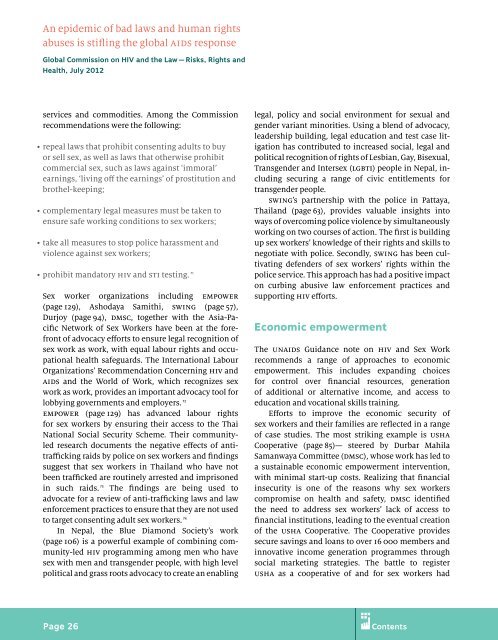The HIV and Sex Work Collection - Joint Programme Monitoring ...
The HIV and Sex Work Collection - Joint Programme Monitoring ...
The HIV and Sex Work Collection - Joint Programme Monitoring ...
You also want an ePaper? Increase the reach of your titles
YUMPU automatically turns print PDFs into web optimized ePapers that Google loves.
An epidemic of bad laws <strong>and</strong> human rightsabuses is stifling the global AIDS responseGlobal Commission on <strong>HIV</strong> <strong>and</strong> the Law — Risks, Rights <strong>and</strong>Health, July 2012services <strong>and</strong> commodities. Among the Commissionrecommendations were the following:• repeal laws that prohibit consenting adults to buyor sell sex, as well as laws that otherwise prohibitcommercial sex, such as laws against ‘immoral’earnings, ‘living off the earnings’ of prostitution <strong>and</strong>brothel-keeping;• complementary legal measures must be taken toensure safe working conditions to sex workers;• take all measures to stop police harassment <strong>and</strong>violence against sex workers;• prohibit m<strong>and</strong>atory <strong>HIV</strong> <strong>and</strong> STI testing. 71<strong>Sex</strong> worker organizations including EMPOWER(page 129), Ashodaya Samithi, SWING (page 57),Durjoy (page 94), DMSC, together with the Asia-PacificNetwork of <strong>Sex</strong> <strong>Work</strong>ers have been at the forefrontof advocacy efforts to ensure legal recognition ofsex work as work, with equal labour rights <strong>and</strong> occupationalhealth safeguards. <strong>The</strong> International LabourOrganizations’ Recommendation Concerning <strong>HIV</strong> <strong>and</strong>AIDS <strong>and</strong> the World of <strong>Work</strong>, which recognizes sexwork as work, provides an important advocacy tool forlobbying governments <strong>and</strong> employers. 72EMPOWER (page 129) has advanced labour rightsfor sex workers by ensuring their access to the ThaiNational Social Security Scheme. <strong>The</strong>ir communityledresearch documents the negative effects of antitraffickingraids by police on sex workers <strong>and</strong> findingssuggest that sex workers in Thail<strong>and</strong> who have notbeen trafficked are routinely arrested <strong>and</strong> imprisonedin such raids. 73 <strong>The</strong> findings are being used toadvocate for a review of anti-trafficking laws <strong>and</strong> lawenforcement practices to ensure that they are not usedto target consenting adult sex workers. 74In Nepal, the Blue Diamond Society’s work(page 106) is a powerful example of combining community-led<strong>HIV</strong> programming among men who havesex with men <strong>and</strong> transgender people, with high levelpolitical <strong>and</strong> grass roots advocacy to create an enablinglegal, policy <strong>and</strong> social environment for sexual <strong>and</strong>gender variant minorities. Using a blend of advocacy,leadership building, legal education <strong>and</strong> test case litigationhas contributed to increased social, legal <strong>and</strong>political recognition of rights of Lesbian, Gay, Bisexual,Transgender <strong>and</strong> Intersex (LGBTI) people in Nepal, includingsecuring a range of civic entitlements fortransgender people.SWING’s partnership with the police in Pattaya,Thail<strong>and</strong> (page 63), provides valuable insights intoways of overcoming police violence by simultaneouslyworking on two courses of action. <strong>The</strong> first is buildingup sex workers’ knowledge of their rights <strong>and</strong> skills tonegotiate with police. Secondly, SWING has been cultivatingdefenders of sex workers’ rights within thepolice service. This approach has had a positive impacton curbing abusive law enforcement practices <strong>and</strong>supporting <strong>HIV</strong> efforts.Economic empowerment<strong>The</strong> UNAIDS Guidance note on <strong>HIV</strong> <strong>and</strong> <strong>Sex</strong> <strong>Work</strong>recommends a range of approaches to economicempowerment. This includes exp<strong>and</strong>ing choicesfor control over financial resources, generationof additional or alternative income, <strong>and</strong> access toeducation <strong>and</strong> vocational skills training.Efforts to improve the economic security ofsex workers <strong>and</strong> their families are reflected in a rangeof case studies. <strong>The</strong> most striking example is USHACooperative (page 85)— steered by Durbar MahilaSamanwaya Committee (DMSC), whose work has led toa sustainable economic empowerment intervention,with minimal start-up costs. Realizing that financialinsecurity is one of the reasons why sex workerscompromise on health <strong>and</strong> safety, DMSC identifiedthe need to address sex workers’ lack of access tofinancial institutions, leading to the eventual creationof the USHA Cooperative. <strong>The</strong> Cooperative providessecure savings <strong>and</strong> loans to over 16 000 members <strong>and</strong>innovative income generation programmes throughsocial marketing strategies. <strong>The</strong> battle to registerUSHA as a cooperative of <strong>and</strong> for sex workers hadPage 26
















